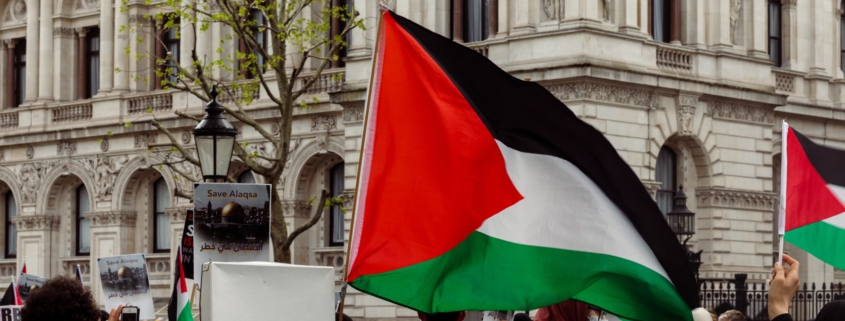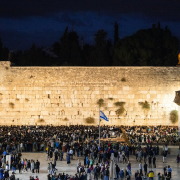Why Don’t Palestinians Have a Sovereign State?
You may think that the Israeli-Palestinian conflict is a conflict between two warring sides that have equal apathy for peace. However, a survey of history shows otherwise.
Palestinians do not have a sovereign state because Palestinian leadership has rejected all peace offers presented to date. Palestinian leadership is more committed to destroying Israel than becoming an independent state and achieving peace.
Below is a timeline of major rejections of peace agreements and clear statements made by Palestinian leadership demonstrating their firm commitment to rejecting two-state solutions.
1937 – Peel Commission
Until 1947, Britain controlled the area known as British Mandate Palestine. Jews and Arabs living there together began having conflicts. Britain sent officials to learn what was causing these conflicts and how they could be solved. They concluded the conflicts were due to the two groups wanting to govern the same land. Britain began drawing up a proposal for two independent states—one for Arabs and one for Jews.1
The Peel Commission granted Arabs 80 percent of the disputed territory and Jews about 17 percent, which included most of the Galilee, the Jezreel Valley, and a portion of the coastal plain. Areas including Tel Aviv, Jaffa, and Jerusalem were to remain under international control.2
Jewish leadership accepted the offer. Arab leadership rejected it and resumed violence.
1947 – United Nation Partition Plan
Britain deferred to the United Nations to find a new two-state solution, and the UN developed the UN Partition Plan.3 This plan gave 55 percent of the land, which was mostly barren, to the Jewish people, and Jerusalem remained under international control. This plan gave Arabs the area of what is now known as the West Bank (Judea and Samaria), the Gaza strip, and much more.4
Jewish leadership accepted the offer, and Arab leadership rejected it. Having been obstructed by diplomatic means, the Jewish leaders went ahead and declared the establishment of the new State of Israel in 1948. Immediately afterward, Jordan, Egypt, Iraq, Lebanon, and Syria attacked Israel.
1967 – The Six-Day War
From 1948 to 1967, Israel had no control over the West Bank because Jordan occupied the area. The Palestinian leadership never demanded an independent state from the Jordanians during this time.5
In 1967, Israel learned Egypt, Syria, and Jordan were planning an attack against them. Israel pre-emptively destroyed their airways and other infrastructure, quickly winning the war. In the span of six days, Israel increased six times in size. Israel gained the Sinai Peninsula, Gaza, the Golan Heights, and the West Bank. Israel offered much of this land back to the Arabic countries in exchange for peace.
In reaction to this offer, the Arab League Summit met in Sudan and issued the “3 No’s.” The Arab League committed to no recognition of the State of Israel, no peace with Israel, and no negotiation with Israel.6
2000 – Camp David Summit
In 2000, Israeli Prime Minister Ehud Barak offered Palestinian leader Yasser Arafat an independent Palestinian state that would have given them all of Gaza, about 94 percent of the West Bank, the Temple Mount, and East Jerusalem as their capital. As part of the agreement, Arafat would be expected to end the conflict with Israel.7
As the end of the summit approached, U.S. President Bill Clinton, who was helping facilitate the meetings between Barak and Arafat said to Arafat, “If the Israelis can make compromises and you can’t, I should go home. You have been here 14 days and said no to everything.”8
Yasser Arafat did not accept this offer, offered no counterproposal, and promptly launched the Second Intifada, sending rockets and suicide bombers into Israel, killing and injuring thousands of innocent Israeli civilians.
2008 – Ehud Olmert’s Peace Offer
From 2006–2008, Prime Minister of Israel Ehud Olmert held 36 negotiation sessions with Mahmoud Abbas, the president of the Palestinian Authority.9 Olmert’s final offer included Ehud Barak’s offer of all of Gaza, about 94 percent of the West Bank, East Jerusalem as capital, and control of the Temple Mount and additional land.10 This deal included a passageway between Gaza and the West Bank, connecting the two areas of what could have been the Palestinian state.11 Abbas turned it down.
Hamas’ Commitment to Destroy Israel
These peace offers did not fail because of diplomacy issues but because of the Palestinian ideological and religious opposition to a Jewish state and the Jewish people. Continuing the legacy of the 3 No’s of the Arab League Summit, the current Palestinian regime in Gaza, Hamas, is dedicated to not being at peace with Israel.
The preamble of Hamas’ original charter written in 1988 states:
“Israel will exist and will continue to exist until Islam will obliterate it, just as it obliterated others before it.”12
From Article Seven of Hamas’ original charter:
“Moreover, if the links have been distant from each other and if obstacles, placed by those who are the lackeys of Zionism in the way of the fighters obstructed the continuation of the struggle, the Islamic Resistance Movement aspires to the realisation of Allah’s promise, no matter how long that should take. The Prophet, Allah bless him and grant him salvation, has said:
‘The Day of Judgement will not come about until Moslems fight the Jews (killing the Jews), when the Jew will hide behind stones and trees. The stones and trees will say O Moslems, O Abdulla, there is a Jew behind me, come and kill him. Only the Gharkad tree, (evidently a certain kind of tree) would not do that because it is one of the trees of the Jews.’ (related by al-Bukhari and Moslem).”13
From Article Thirteen of Hamas’ original charter:
“Initiatives, and so-called peaceful solutions and international conferences, are in contradiction to the principles of the Islamic Resistance Movement.”14
In December 2015, Hamas leader Khaled Meshaal said, “The so-called peace process is futile. There is no peace. Only the path of Jihad, sacrifice, and blood (will bear fruit).”15
This commitment to violence by the Palestinian leadership is tragic and demoralizing. They are more committed to destroying Israel than to establishing a state for Palestinian civilians. This has proven true time and time again with the history of rejected peace offers and violence.
We must pray for the civilians of Palestine, that they are free from the suffering caused by the failures and evils of Palestinian leadership. We must pray for Israel to handle this tense relationship with wisdom and discernment. Finally, we must pray expectedly, hoping for the return of the Messiah, who will ultimately bring true peace to the Middle East and to the world.
Footnotes
- “British Palestine Mandate: The Peel Commission (July 1937),” in Jewish Virtual Library, accessed October 13, 2023, https://www.jewishvirtuallibrary.org/the-peel-commission.
- Benny Morris, Righteous Victims: A History of the Zionist-Arab Conflict, 1881-1999, 1st ed (New York: Knopf, 1999), 139.
- “United Nations Partition Plan of 1947 – Map,” Question of Palestine, accessed October 13, 2023, https://www.un.org/unispal/document/auto-insert-208958/.
- “United Nations Resolution 181 | Map & Summary | Britannica,” September 29, 2023, https://www.britannica.com/topic/United-Nations-Resolution-181.
- “Israel and the Arab-Israeli Conflict” (American Jewish Committee), 13, accessed October 13, 2023, https://viewer.joomag.com/israel-and-the-arab-israeli-conflict/0000022001452533971.
- “Israel-Arab Peace Process: The Khartoum Resolutions (September 1, 1967),” in Jewish Virtual Library, accessed October 13, 2023, https://www.jewishvirtuallibrary.org/the-khartoum-resolutions.
- Mitchell Geoffrey Bard, ed., Myths and Facts: A Guide to the Arab-Israeli Conflict (Chevy Chase, MD: American-Israeli Cooperative Enterprise, 2017), 254.
- Alan Sipress, “Adviser: Clinton Exasperated With Barak During Talks,” Washington Post, July 18, 2001, https://www.washingtonpost.com/archive/politics/2001/07/18/adviser-clinton-exasperated-with-barak-during-talks/1b58f476-6f8e-4de4-bf66-89094f439493/.
- “Ehud Olmert’s Peace Offer (2006 – 2008),” in Jewish Virtual Library, accessed October 13, 2023, https://www.jewishvirtuallibrary.org/ehud-olmert-s-peace-offer.
- “Israel Offers Palestinians Control of Ramallah, Nablus and Jenin,” The Jerusalem Post | JPost.com, August 28, 2007, https://www.jpost.com/israel/israel-offers-palestinians-control-of-ramallah-nablus-and-jenin-73497.
- “Ehud Olmert’s Peace Offer (2006 – 2008).”
- “Hamas Covenant 1988,” The Avalon Project, October 13, 2023, https://avalon.law.yale.edu/20th_century/hamas.asp.
- “Hamas Covenant 1988.”
- “Hamas Covenant 1988.”
- Bard, Myths and Facts, 279.









